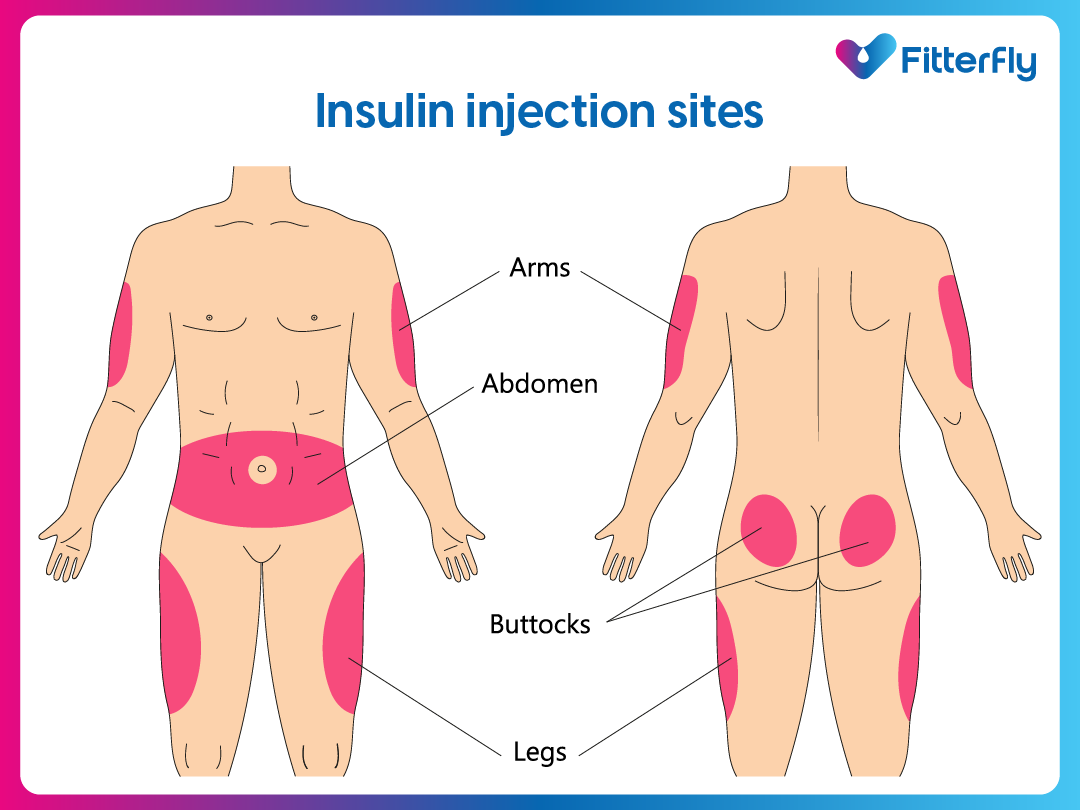Insulin for Diabetes – What it is? Its Role, Types and Uses

If you or anyone you know has diabetes, you would have definitely heard the term ‘insulin.’ Though there are so many myths around insulin, in this article, we will help you understand:
- What is insulin and why does our body need it?
- What is the role of insulin in diabetes?
- Types of insulin, its storage and side effects.
What is Insulin, and What does it Do?
Insulin is a natural hormone made by the pancreas that helps keep our blood sugar levels normal. It is like a key that unlocks our body’s cells so that glucose (sugar) from food can enter them, and ultimately, our body can use that glucose for energy.
If we don’t have enough insulin or it doesn’t work right, sugar can’t get into the cells and continues being in the blood. When this happens, the sugar level in the blood goes up, leading to diabetes.
Now, let’s learn why some people are treated with insulin for diabetes.
Why Are Some People With Diabetes Treated With Insulin?
The reason why some people with diabetes need to be treated with insulin is because their body either don’t produce enough insulin or can’t use it effectively. That’s why they might need external insulin therapy.
Now, depending on the type of diabetes, your doctor may prescribe different types of insulin.
- People with type 1 Diabetes need insulin injections throughout their lives along with lifestyle management, as their bodies do not produce insulin.
- Some people, even with type 2 diabetes, may need insulin, especially when there is:
- Very high sugars (hyperglycemia)
- Insulin deficiency
- Infections
- Before and after any surgery
- Diabetes Ketosis etc.
- During Pregnancy-Related Diabetes: If a woman gets gestational diabetes during her pregnancy, then to treat it, insulin is often considered to be the safest option.
- Other types of diabetes e.g., LADA (Latent Autoimmune Diabetes in Adults) and MODY (Maturity-Onset Diabetes of the Young)
To know your chances of Diabetes reversal, take the Diabetes Reversal TestDiabetes Reversal
Calculator
Types of Insulin
Doctors prescribe different types of insulin according to their requirements and availability. The following are the main types of insulin that are usually given:
- Rapid-acting
- Short-acting
- Intermediate-acting
- Long-acting
- Ultra long-acting
- Mixed Insulin
Where to Take Insulin
Insulin is typically injected subcutaneously, just below the skin, which you can easily take at home. However, it can also be administered intravenously or intramuscularly in a hospital.


Common body sites for injection include
- Abdomen (around the umbilicus)
- The lateral side of the thigh
- Back of the arm
Are There Any Side Effects of Insulin?
Though there are very few side effects with newer insulins, some side effects could be:
- Hypoglycemia (low blood sugar level)
- Repeated injections at the same site could lead to swelling or change in the tissues (atrophy/lipoatrophy/lipohypertrophy)
If you notice any symptoms, talk to your doctor.
Now, let’s answer the question in your mind!
Can I Avoid Using Insulin?
Though it might sound cliched, the honest answer to that question is “It Depends on your condition”.
If you are someone who has just entered the prediabetes stage or entered diabetes, control your blood sugar levels through proper lifestyle modification (healthy, regular exercise, reducing stress and improving sleep).
This can avoid getting into a stage where insulin administration is needed.
However, if you have advanced diabetes, then insulin might be needed, but we strongly recommend you check with your doctor first.
If you are looking for guidance on the right approach, we are here to help. We have an expert team of diabetologists, nutritionists, physiotherapists, fitness experts and psychologists who first understand your health condition by gathering your data and reviewing your diabetes history.
Based on this information, they curate a personalized program with the help of technology to monitor you, such as CGM sensors which are included in the program.
All you need to do is give us a missed call on 08068507599 or check out Fitterfly’s Diabetes Prime Program and choose according to your needs.
This blog provides general information for educational and informational purposes only and shouldn't be seen as professional advice.
Frequently Asked Questions
Which hormone controls blood glucose levels?
Insulin controls our blood sugar levels in the body.
What are the main tools for insulin delivery?
When it comes to administering insulin, there are several tools available to choose from. The main options include: Insulin Syringe & Vials, Insulin Pens, and Insulin Pump
How should I decide which tool is best for me?
Your doctor will consider various factors such as ease of application, cost, and availability before suggesting the best insulin delivery option for you.
What key points should I remember before starting insulin?
Before starting insulin therapy, it's essential to keep the following points in mind: Carefully read your prescription, ensuring you understand details such as the insulin name, dose, and timing, Always cross-check the insulin provided by the chemist with your prescription, checking the expiration date and reading the product insert for additional information, Learn how to inject insulin correctly and store any remaining insulin properly, Understand the site of insulin injection and how to manage and prevent hypoglycemia.
How should I store insulin?
Proper storage of insulin is important for maintaining its effectiveness. Here are some tips: Store unopened insulin in the door of the refrigerator, Once opened and injected, remove the needle and store the insulin in the refrigerator door until the next use, Alternatively, you can keep insulin in a cool, dry place away from direct sunlight, Insulin should be discarded if you notice any particles or color changes indicating potential contamination.
How do I know if I need insulin for diabetes?
The need for insulin depends on the type and severity of your diabetes. Your healthcare provider will determine if you need insulin based on your blood sugar levels, the type of diabetes you have, and how your body responds to other treatments.
Are there different types of insulin for diabetes?
Yes, there are various types of insulin, categorized by how quickly they start to work and how long their effects last. These include rapid-acting, short-acting, intermediate-acting, and long-acting insulins.
REVERSED Diabetes in 3 months


Happy members
EMI
Guarantee
4.8/5
Diabetes Prime Program




















